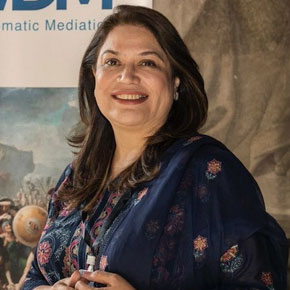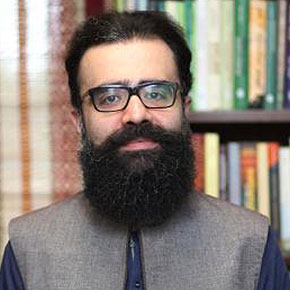The Claims to Pakistaniat: Citizenship Dilemmas and Their Implications
Citizenship is a context-dependent concept which is performed, negotiated, and practised under historical, cultural, political, and social legacies. The idea of an individual’s notion of citizenship vis-à-vis the sense of self is multidimensional which relies on the relationships between the citizen/state as well as the citizen with other citizens. Both liberal and republic theories of citizenship tend to homogenise the individual citizens into predefined categories either by state or the public discourse which diminishes the citizens' identities and their rights. Over the course of Pakistan’s history, the merging of Pakistaniat with a religious identity resulted in the alienation of the religious minorities of Pakistan. The systematic marginalisation of religious minorities was a small part of a more comprehensive plan of building a theocratic Pakistani nation based on the narrow interpretation of Islam by redefining the idea of what counts as citizenship in Pakistan. This debate is ongoing, but the notion of citizenship, as articulated, carries an inherent bias towards exception and regulation by the state. By centering the discourse of religious exclusion this interdisciplinary panel will bring together scholars from Sociology, Anthropology, Political Science and History to discuss the implications of religious centric state policies and their impact on the construction, performance, and negotiation of Pakistaniat by religious minorities.
Panelists
 Nilofar Bakhtiar
Former Federal Minister and Senator
Nilofar Bakhtiar, with over thirty years of service in politics and social welfare, has significantly impacted Pakistan's landscape. She has served two terms as a Member of Parliament and held key federal cabinet positions, including Minister for Women Development, Special Education, Social Welfare, and Tourism. Notably, she was the first woman elected as a Board Director of Lions Clubs International and has served as a special advisor to the Secretary-General of the UN World Tourism Organization. Nilofar's efforts in transformative legislation include establishing a 17% quota for women in Parliament, the passage of the Honor Killing Bill, amendments to the Hudood Ordinances, and the implementation of the Harassment at Workplace and Acid Crime Prevention Acts. She has represented Pakistan on international platforms As the Chairperson of the National Commission on the Status of Women (NCSW), Nilofar has led the establishment of provincial commissions on the Status of Women, the creation of the National Gender Data Portal, and the launch of the Commission’s first-ever Strategic Plan 2022-2025. She has driven significant national research studies on women's economic empowerment, climate equity, digitalization, and the impact of COVID-19 on women. She also initiated the National Media Fellowship and the Art of Parenting programs. Nilofar holds certifications in hotel and tourism from Cornell University and Schloss Klessheim, and a graduate diploma in Public Administration from Carnegie Mellon University. She is also the Founder and Chairperson of Bardasht, a non-profit advocating for the rights of children, women, and minorities.
Nilofar Bakhtiar
Former Federal Minister and Senator
Nilofar Bakhtiar, with over thirty years of service in politics and social welfare, has significantly impacted Pakistan's landscape. She has served two terms as a Member of Parliament and held key federal cabinet positions, including Minister for Women Development, Special Education, Social Welfare, and Tourism. Notably, she was the first woman elected as a Board Director of Lions Clubs International and has served as a special advisor to the Secretary-General of the UN World Tourism Organization. Nilofar's efforts in transformative legislation include establishing a 17% quota for women in Parliament, the passage of the Honor Killing Bill, amendments to the Hudood Ordinances, and the implementation of the Harassment at Workplace and Acid Crime Prevention Acts. She has represented Pakistan on international platforms As the Chairperson of the National Commission on the Status of Women (NCSW), Nilofar has led the establishment of provincial commissions on the Status of Women, the creation of the National Gender Data Portal, and the launch of the Commission’s first-ever Strategic Plan 2022-2025. She has driven significant national research studies on women's economic empowerment, climate equity, digitalization, and the impact of COVID-19 on women. She also initiated the National Media Fellowship and the Art of Parenting programs. Nilofar holds certifications in hotel and tourism from Cornell University and Schloss Klessheim, and a graduate diploma in Public Administration from Carnegie Mellon University. She is also the Founder and Chairperson of Bardasht, a non-profit advocating for the rights of children, women, and minorities.
 Dr. Stephen Lyon
Dean of the Faculty of Arts and Sciences; Aga Khan University
Dr. Stephen Lyon: Professor Lyon is a cultural anthropologist with an interest in social organisation, cultural systems, conflict, and development in rural and urban Pakistan. He has carried out longitudinal field research in rural and urban Pakistan since 1998. He was the Editor-in-Chief of Social Science Computer Review(a SAGE journal) from 2020-2023.
Dr. Stephen Lyon
Dean of the Faculty of Arts and Sciences; Aga Khan University
Dr. Stephen Lyon: Professor Lyon is a cultural anthropologist with an interest in social organisation, cultural systems, conflict, and development in rural and urban Pakistan. He has carried out longitudinal field research in rural and urban Pakistan since 1998. He was the Editor-in-Chief of Social Science Computer Review(a SAGE journal) from 2020-2023.
 Dr. Ali Usman Qasmi
Associate Professor, History, Mushtaq Ahmad Gurmani School of Humanities and Social Sciences, LUMS
Dr. Ali Usman Qasmi: Ali Usman Qasmi, is an Associate Professor (History) at the School of Humanities and Social Sciences at LUMS. He has published extensively in reputed academic journals such as Modern Asian Studies and Journal of Islamic Studies. He is the author of Questioning the Authority of the Past: The Ahl al-Qur’an Movements in the Punjab (2011), The Ahmadis and the Politics of Religious Exclusion in Pakistan (2014) and Qaum, Mulk, Sultanat: Citizenship and National Belonging in Pakistan (2023).
Dr. Ali Usman Qasmi
Associate Professor, History, Mushtaq Ahmad Gurmani School of Humanities and Social Sciences, LUMS
Dr. Ali Usman Qasmi: Ali Usman Qasmi, is an Associate Professor (History) at the School of Humanities and Social Sciences at LUMS. He has published extensively in reputed academic journals such as Modern Asian Studies and Journal of Islamic Studies. He is the author of Questioning the Authority of the Past: The Ahl al-Qur’an Movements in the Punjab (2011), The Ahmadis and the Politics of Religious Exclusion in Pakistan (2014) and Qaum, Mulk, Sultanat: Citizenship and National Belonging in Pakistan (2023).
 Dr. Zaheer Ali
Assistant Professor, Department of Social Sciences and Liberal Arts, IBA
Dr. Zaheer Ali is an Assistant Professor at IBA. Dr. Zaheer completed his Ph.D. from Royal Holloway and Bedford College, University of London, and his MPhil from Quaid e Azam University.
Dr. Zaheer Ali
Assistant Professor, Department of Social Sciences and Liberal Arts, IBA
Dr. Zaheer Ali is an Assistant Professor at IBA. Dr. Zaheer completed his Ph.D. from Royal Holloway and Bedford College, University of London, and his MPhil from Quaid e Azam University.

